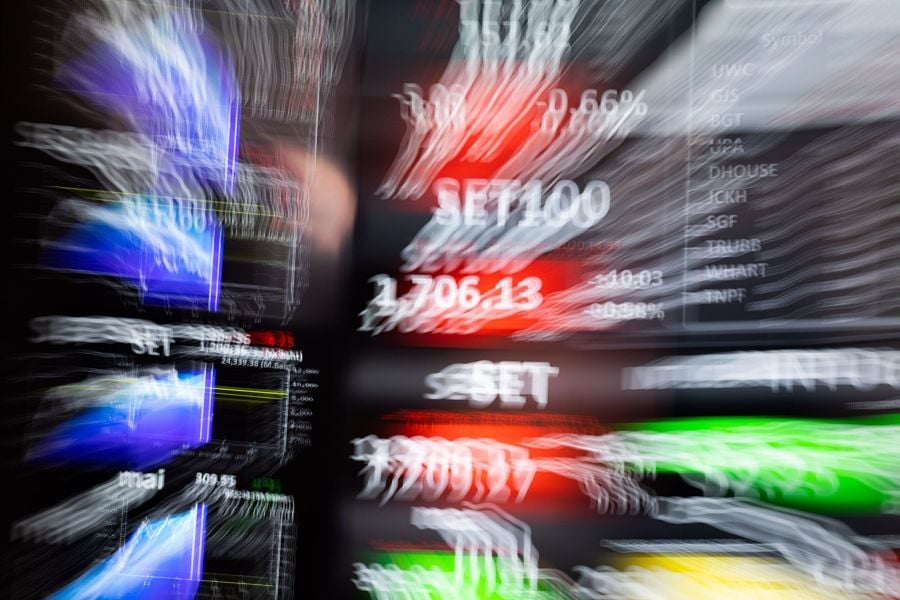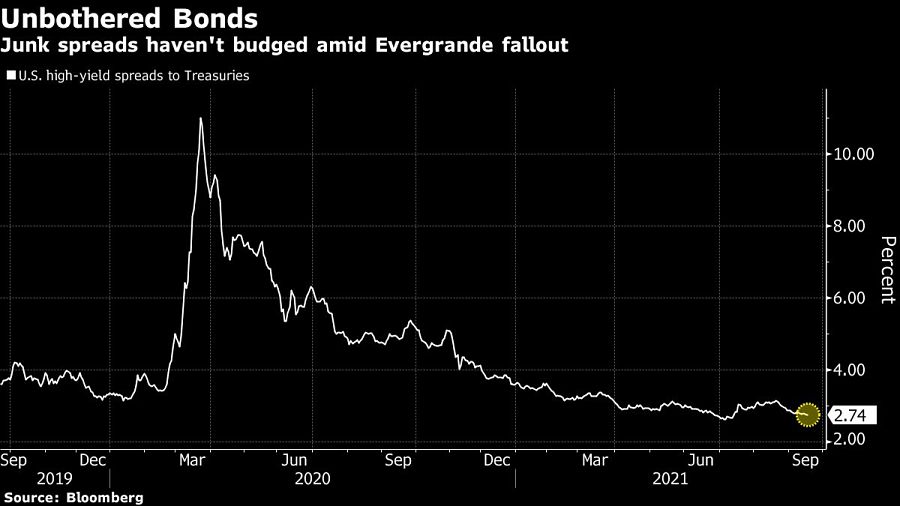

A Chinese property owner implodes, and in short order the shares of American social media and auction companies are tumbling. The chain reaction may say more about the extreme altitude of global risk assets than it does about economic contagion.
While it doesn’t require excessive sleuthing to understand why commodity and banks are quaking in the vortex surrounding Evergrande, the link between the lender’s travails and a stock like Twitter Inc. or EBay Inc. are harder to see.
“You’ve got a whole basket of things to be concerned about -- throw this headline into the mix and that throws everything askew. So there’s going to be irrational de-risking taking place that doesn’t connect logically,” Art Hogan, chief strategist at National Securities, said of the Evergrande crisis. “Does it make sense for technology stocks to be selling? No, but in a risk-off scenario, everything tends to be for sale -- even cryptocurrencies.”
Though there may not be an obvious connection between some U.S. tech stock and China, that doesn’t mean the sell-off makes no sense. Sky-high valuations have been bear fodder for months, and Federal Reserve hawks are circling. Evergrande may seem like a flimsy rationale, but Monday’s rout is similar in size to a half-dozen other market plunges in 2021 that didn’t require any news to ignite.
In fact, investors took the opportunity to sell in a market that’s been priced to perfection. The Russell 2000 Index of smaller companies, typically thought of as being more U.S.-oriented and with less international exposure than the S&P 500, led the declines, falling as much as 3.6% Monday. An index of regional banks, stuffed with companies like Bank of Hawaii Corp. and PacWest Bancorp, lost 3.9% at one point.
The iShares MSCI Emerging Markets ex-China ETF, which aims to excludes China, fell more than 2%, while Twitter, which is not directly accessible in the country, lost more than 4% at one point. And companies only operating in the U.S., like supermarket chain Kroger Co., also dropped.
In other words, lots of assets are getting embroiled in the sell-off, and “I don’t know that that’s entirely appropriate,” said Hogan.
Still, the word “contagion” is being thrown around due to Evergrande’s size. The Chinese real estate developer has about $300 billion worth of liabilities, more than any other property developer in the world, Bloomberg has reported, and it accounts for about 16% of outstanding notes in China’s high-yield dollar bond market. Though worries over the company’s ability to service its debt have been percolating for weeks, those concerns came into greater focus this week because some $83.5 million of interest on a five-year dollar bond is coming due Thursday for Evergrande.
But investors are also contending with plenty other worries: weakening earnings forecasts, a slow shift in Federal Reserve policy, uncertainty in Washington, D.C., and more.
“With the high valuations, the Fed meeting tomorrow, we have a perfect storm for a very difficult day today,” Katy Kaminski, chief research strategist and portfolio manager for AlphaSimplex Group, said in an interview. “For us, it’s much more of an underlying problem that is much more economic in nature and pervasive as opposed to something simply financial.”
Not all of Monday’s tumbles were without reason. A Goldman Sachs basket of Russell 1000 companies with the highest sales exposure to China fell as much as 3.3% during the session, its worst day since mid-May, while another focused on stocks that are exposed heavily to supply chains in the country -- also tracked by the bank -- dropped 3.7% at its worst.
Jerry Braakman, chief investment officer of First American Trust, said that it also makes sense that commodities like copper, iron ore and crude oil would decline.
“China is still a huge demand driver for basic commodities because they’re doing all the manufacturing for us,” he said. Braakman also singled out some of the tech giants, including Apple Inc. and Tesla Inc., with big China exposure. Apple in 2020 booked roughly 15% of its revenue in China, a figure that clocked in at 21% for Tesla, according to data compiled by Bloomberg.
To Gene Tannuzzo, a portfolio manager at Columbia Threadneedle, it’s logical that names tied to China’s property sector and related commodities would be hit, so he and his team are watching slumping iron ore prices. “If other commodities follow it lower -- oil, copper -- that is generally correlated with weaker returns for U.S. high yield,” and the latter still suggests risk of contagion is low, he said. “Everything is a little softer today, but none of those charts look like iron ore yet.”

Sameer Samana, senior global market strategist at Wells Fargo Investment Institute, is also looking at high-yield spreads for an inkling of whether a contagion is at hand. To him, the sell-off in U.S. stocks is much more about extreme positioning and a relentless buy-the-dip mentality that may have cut into sidelined cash that’s typically been used during drawdowns.
“Until high-yield spreads in the U.S. widen further, this should be viewed as an opportunity in U.S. equities,” Samana said.

While industry statistics pointing to a succession crisis can cause alarm, advisor-owners should be free to consider a middle path between staying solo and catching the surging wave of M&A.

New joint research by T. Rowe Price, MIT, and Stanford University finds more diverse asset allocations among older participants.

With its asset pipeline bursting past $13 billion, Farther is looking to build more momentum with three new managing directors.

A Department of Labor proposal to scrap a regulatory provision under ERISA could create uncertainty for fiduciaries, the trade association argues.

"We continue to feel confident about our ability to capture 90%," LPL CEO Rich Steinmeier told analysts during the firm's 2nd quarter earnings call.
Orion's Tom Wilson on delivering coordinated, high-touch service in a world where returns alone no longer set you apart.
Barely a decade old, registered index-linked annuities have quickly surged in popularity, thanks to their unique blend of protection and growth potential—an appealing option for investors looking to chart a steadier course through today's choppy market waters, says Myles Lambert, Brighthouse Financial.
